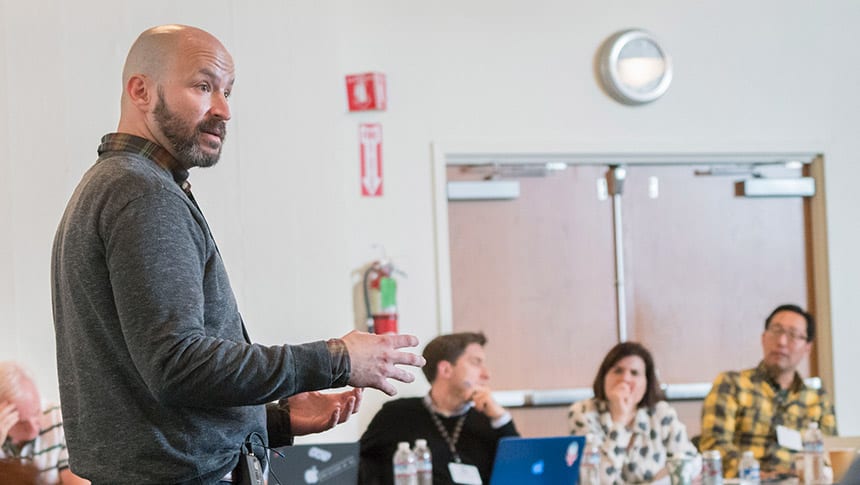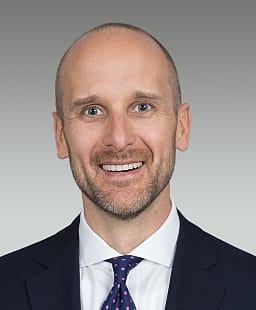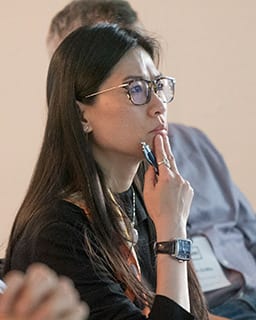
By Andrew Cohen
For Michael Didiuk, Berkeley Law’s new executive education platform is already transformative. While working as a U.S. Securities & Exchange Commission (SEC) lawyer, he increasingly confronted issues related to blockchain—a high-tech ledger of transactions, originally developed to support the cryptocurrency bitcoin, that became a popular method of tracking digital assets.
Didiuk enrolled in Blockchain Unlocked, Berkeley Law’s pioneering three-day academy of presentations, small-group discussions, and interactive workshops led by industry experts. “Blockchain was blowing up and I needed to better understand what the industry was about, the technology behind it, and why people were investing in it,” he recalls. “I heard about Berkeley Law’s program and thought, ‘Wow, this is exactly the type of program I need.’”

Didiuk left the SEC late last year to join Perkins Coie’s fintech and blockchain practices as a partner in the firm’s San Francisco office. He represents clients on various federal securities laws and complex regulatory issues raised by blockchain technology, and in connection with the emergence of digital asset sales and digital securities.
The Berkeley Law program gave Didiuk access to blockchain stakeholders he had rarely encountered—investors, entrepreneurs, academics, developers—creating “a whole new level of knowledge. The presenters and program’s staff offered a great mix of legal, entrepreneurial, and regulatory insights and they were very skilled at making the content accessible.”
That type of career- and network-enhancing experience, in the form of timely training and flexible options, is exactly what Adam Sterling ’13 had in mind while shaping Berkeley Law’s executive education initiative.
“We’re trailblazing new terrain here,” says Sterling, executive director of the school’s Berkeley Center for Law and Business. “This is the first executive education program to capture the intersection of law, business, and leadership. Berkeley Law is the only place for these innovative, topical courses and programs that many people—lawyers, finance industry folks, investors, corporate leaders—really need.”
Under this tent, Berkeley Law offers academies, executive courses and certificates, MCLE programs, and customized trainings.
“Whether it’s cryptocurrencies, venture capital deal-making, or valuation, our exec ed programs leverage the scholarly expertise of Berkeley’s world-class faculty along with our deep industry contacts to offer a truly unique, hands-on educational experience,” says Berkeley Law Professor Robert Bartlett. “As a result, participants walk away with both enhanced knowledge and immediately deployable skills.”
Academies: beyond academics
The academies offer intensive, in-person, certificate programs for executives and practicing attorneys. They include the nation’s first law school certificate program in blockchain, as well as banking law and fintech, venture capital (VC), and finance for lawyers. The innovative blockhain program drew coverage in the New York Times and the San Francisco Business Times.
On May 15, an anti-harassment academy called The Globalization of the #MeToo Movement will offer a one-day program to examine best practices for creating safe and inclusive workplaces. Academies will also soon be available in cybersecurity, deal valuation, energy innovation, and other areas.
At the VC Deal Camp, venture capitalists, angel investors, fund managers, and attorneys learn how to structure, negotiate, and execute early-stage investments. More than 100 people from 25 countries have participated since October 2016, and Berkeley Law held its fourth session of the camp last week.

Sally Tong, managing director of a Hong Kong venture capital firm, attended the October 2017 program and credits it for delivering some eye-opening, myth-busting lessons.
“I had a misconception about negotiations, that it was about win and lose in the deal discussion,” Tong says. “The instructor used a very dynamic and interactive way to communicate the fundamental concepts to use in every negotiation … why we should work towards an integrative, value-based agreement, and how to facilitate and manage the entire negotiation process.”
She recalls that feedback on a negotiation exercise with fellow classmates “helped us to evaluate our skills and predispositions, utilize key concepts to hone our performance, and gain greater confidence to succeed. It really changed my perspective.”
Tong also enjoyed the deal camp’s “Term Sheet Olympics,” where teams took turns role-playing as venture capitalists and company founders. “Being with world-class instructors … who share their insights, experience, and forward thinking is an invaluable asset for one’s future direction,” she says. “In turn, meeting diverse fellow classmates brings innovative thinking and open discussions that lead to a strong network.”
Other offerings
Practicing lawyers can take executive courses and certificates in law, business, and professional development during the summer at Berkeley Law. Individual courses tackle mergers and acquisitions, renewable energy law, corporate finance, negotiations, contracts, and intellectual property law. Participants can also take groups of courses to earn a certificate in business law, law and technology, public law and regulation, or energy and environmental law.
“In addition, we’ll be offering a new suite of courses and a certificate on business fundamentals, which include one-unit introductory courses on accounting, blockchain, big data and data strategy, and design thinking,” Sterling says. “And we’re busy putting together courses in other emerging areas.”
Berkeley Law offers myriad MCLE credit programs, along with an online calendar for attorneys to access them. Departments from across the law school will post events that offer MCLE credits, giving individuals and organizations a single place to find such programs offered in collaboration with UC Berkeley.
The executive education program also works with private and public sector entities to design customized executive education trainings. Examples include venture capital academies in Seoul, Madrid, and Dubai; a year-long fundamentals of U.S. business and law program for scholars from Kazakhstan; and practice-area trainings for policymakers in Thailand.
Whatever the topic or format, Berkeley Law’s executive education platform promises value both immediate and enduring.
“We have many options tailored to different needs, and it’s great to see how these programs are drawing people from all over the world,” Sterling says. “We’re covering a lot of new and emerging areas, and in some instances the training we provide helps our LL.M. students and international lawyers create the law in their own country. That’s really gratifying.”